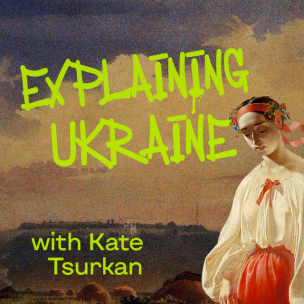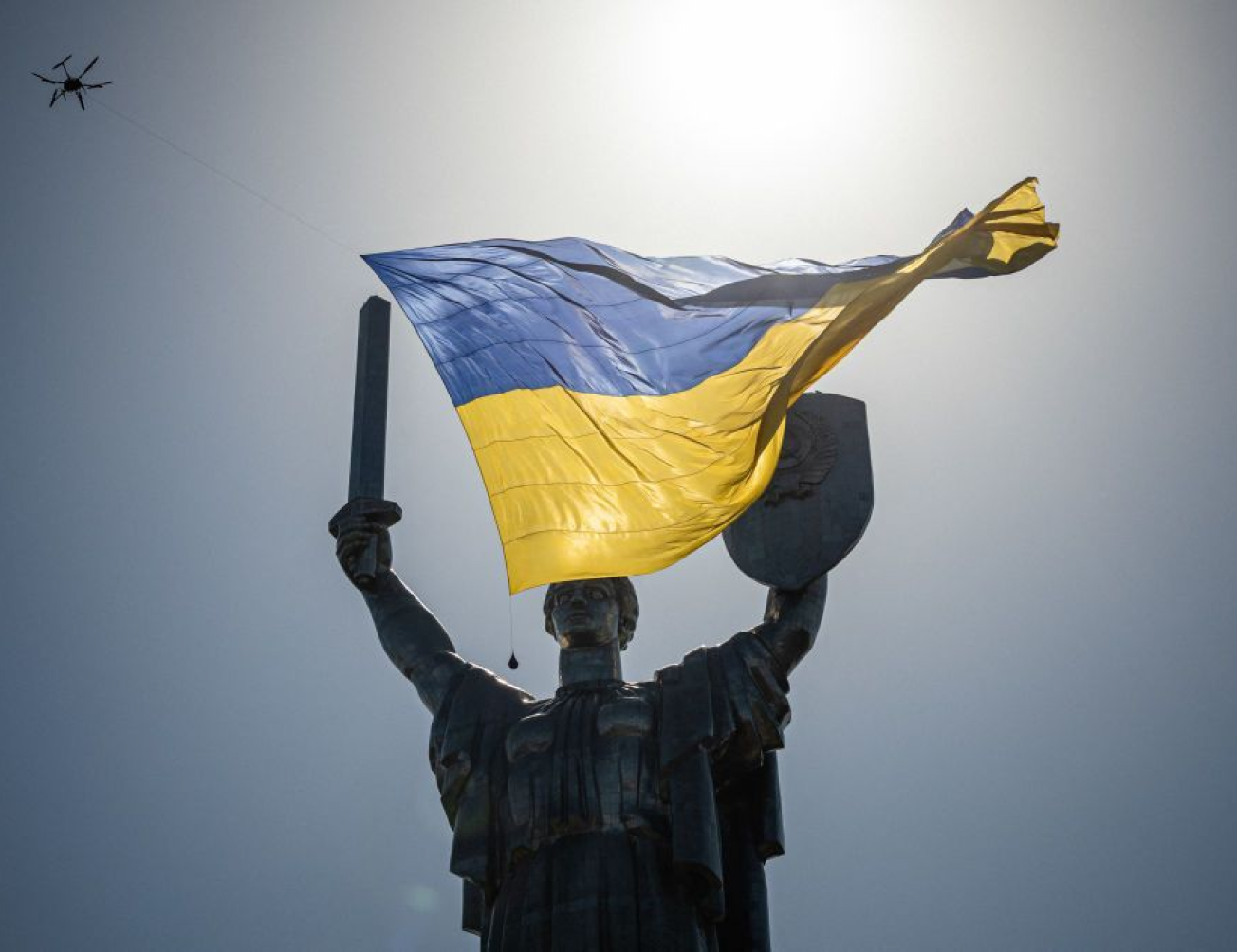
(Illustration by Mari Kinovych/The Kyiv Independent)
In nearly every village, town, and city across Ukraine today, you can spot some kind of monument to the 19th-century poet and artist Taras Shevchenko.
Following Ukraine’s independence in 1991 and the Euromaidan Revolution in 2014, many of them replaced statues of 20th-century Bolshevik revolutionary leader Vladimir Lenin that had symbolized the Soviet Union’s grip on Ukraine for close to 70 years.
Shevchenko's widespread presence throughout Ukraine in many ways highlights that the heart of contemporary Ukrainian society is a poet.
Central to many of his works are notions of perseverance, unity, and kindness in the face of adversity, ideas that resonate in a country that has seen its sovereignty threatened and denied by Russia and other aggressors throughout history.
In his 1838 poem, “Shall we ever meet again,” Shevchenko instructs Ukrainians:
“Love your dear Ukraine, adore her / Love her…in fierce times of evil / In the last dread hour of struggle.”
Almost 200 years later, Ukrainians have turned to his works in their latest struggle against Russia’s invasion. A now famous video from the Ukrainian Armed Forces’ Kharkiv Oblast counteroffensive in September 2022 serves as a testament to this.
In the video, Ukrainian soldiers rip down a Russian propaganda poster in the liberated city of Balakliia. Underneath it is a billboard poster with lines from Shevchenko’s poem “The Caucuses'' (1845).
The featured lines of Shevchenko’s poem, which invokes themes of national identity, resilience, and the fight for justice, are known by just about every Ukrainian today, regardless of whether they’re a fan of literature or not: “Keep fighting–you are sure to win! God helps you in your fight.”
Shevchenko’s life is defined by his long struggle against injustice. Born a serf and only freed at almost 30 years of age, he faced arrest and exile for his groundbreaking works of art that have inarguably shaped the modern Ukrainian identity.
Shevchenko’s early life
Shevchenko was born on March 9, 1814, in the village of Moryntsi, located in Ukraine’s central Cherkasy Oblast.
Most of modern-day Ukraine was under the control of the Russian Empire in Shevchenko’s lifetime. Through a series of legislative bans, tsarist authorities went to great lengths to suppress the Ukrainian language, culture, and traditions.
Serfdom in the Russian Empire meant that Shevchenko’s family did not own the land they worked on and lacked the same legal rights as ordinary citizens.
Shevchenko grew up in the village of Kyrylivka, now called Shevchenkove, located in Cherkasy Oblast. The land of the village was owned by Russian nobleman Vasily Engelhardt. After his death in 1828, the land passed to his son Pavel, who eventually took then-young Taras Shevchenko with him to St. Petersburg as his servant.

It wasn’t until 1838 that Shevchenko, by then 28 years old, would be released from serfdom, thanks to the help of those who took notice of his talent as a painter.
In the years that followed, he devoted his life’s work to championing the cause of an independent Ukraine.
Shevchenko’s life & work after serfdom
Shevchenko could have chosen a quiet life after gaining his freedom. Instead, he fully immersed himself in his literature and art, both of which celebrated Ukrainian culture. Through his work, he also aimed to raise awareness about the hardships faced by serfs and other social injustices within the Russian Empire.
His poem “Kateryna” (1838), part of his famous collection “Kobzar” published in 1840, is centered around a naive young maiden who is betrayed by a soldier of the Russian imperial army.
The opening lines of the poem begin with Shevchenko encouraging young maidens to fall in love “but not with Muscovites, / For Muscovites are foreign folk / They do not treat you right.”

'Kateryna', a painting by Taras Shevchenko (1842).(Wikimedia)
The eponymous heroine ends up pregnant after being seduced by the soldier. As a result, she is shunned by her family, her village, and everyone she asks for help along the way as she goes off in search of him. When she eventually locates him, he rejects both her and their son.
Kateryna’s tragic story is both one of unjust power dynamics in a patriarchal society and, more broadly, how easy it can be for someone in a position of power to take advantage of others. In this sense, the poem holds a universal appeal.
In the backdrop of Ukraine’s enduring struggle against Russia and the full-scale invasion, it's impossible to ignore the objectification of Ukrainian women by Russian imperialists that Shevchenko’s poem also highlights.
Celebrating Russia’s full-scale invasion, infamous Kremlin propagandist Margarita Simonyan fantasized online in November 2022 about the day when “our (Russian) husbands will again crane their necks to check out the black-browed Oksanas” in a “hospitable, cheerful, bright” Kyiv.
One of the most famous Soviet Union films is “Christmas Eve” (1961) an adaptation of 19th century Ukrainian author Mykola Gogol’s story of the same name. The heroine and love interest is a beautiful dark-haired woman named Oksana.
The source of Simonyan’s delusion of Ukraine as a Russian playground liberated from an imagined tyranny can be traced back through centuries of Russian cultural figures, including those beloved by the West today.
For example, 19th-century poet Aleksandr Pushkin wrote poems like “To The Slanderers of Russia” that furthered the notion of “brotherly Slavs” who would unite to defend Russia against any outside force despite their internal quarrels.
Despite the prevailing cultural climate in the Russian Empire, later the Soviet Union, and in current-day Russia, which has claimed that Ukrainians and other groups are somehow indistinguishable linguistically and culturally from Russians, artists such as Taras Shevchenko have persisted in their work, even when they faced significant personal risks.
Shevchenko’s return to Ukraine
Shevchenko was enrolled as a student at the Imperial Academy of Arts in St. Petersburg between 1840 and 1845. During his studies, he made several trips back to his native Ukraine, the first being in 1843.
He traveled widely, conducted ethnographic sketches, and wrote. In many ways, these trips further radicalized him against the injustices committed by the Russian Empire against the Ukrainians.
One of his most famous poems is “The Dream” (1844), in which a bard’s visions of a free and prosperous Ukraine are interrupted by the trials of its people.
In the poem, Shevchenko calls Tsar Nicholas I “crafty, evil, grasping” and “poison-fanged viper” and condemns the Russian Empire for the destruction of the Ukrainian Cossack Hetmanate: “What did you with the Cossacks do? / Their noble bones you sank / In the morass and on them built / Your capital-to-be / On tortured Cossack corpses built!”

Taras Shevchenko's self-portrait (1843). (Wikimedia)
The Cossacks were free men who established an autonomous military state, also known as the Hetmanate, that lasted from the mid-17th century until its destruction by Russia in the late 18th century. Their warrior-like legacy has been a source of inspiration not only for Shevchenko but subsequent generations of Ukrainians, particularly during periods of national revival.
In “The Dream,” Shevchenko explores not only the harsh conditions of those living on the territory of modern-day Ukraine but also the penal colonies of Siberia.
Shevchenko accuses the Russian Empire of benefitting from the suffering of others to enrich itself:
“It was you that drove us from Ukraine / A hungry, tattered lot / Into these far-off snows to toil, / And here our throats you cut / Our bleeding skins you used as cloth / To make your purple robe / Our sinews served you as the thread / With which the robe to sew.”
Shevchenko also goes on to describe the tsar’s wife as a “dried-up prune” in the poem, along with other insults, such as, “Is this the beauty rare they praise? Poor thing, you are a wreck!”
Tsarist authorities confiscated copies of Shevchenko’s work when they arrested members of the Brotherhood of St. Cyril and Methodius in Kyiv in 1847. The secret society called for the abolition of serfdom, the promotion of mass education, and the freedom of Slavic nations to embrace their own languages and cultures.
Shevchenko was also arrested and sentenced to 25 years of military service in exile.
According to a letter dated December 1847 from Russian literary critic Vissarion Belinsky to his fellow critic Pavel Annenkov, the lines in Shevchenko's “The Dream” ridiculing the tsar's wife had greatly angered Tsar Nicholas I.
Belinsky’s letter also reveals how elements of the Russian intellectual elite dismissed those who maintained Ukraine is its own distinct nation instead of merely a "little Russia.”
Belinsky declares that neither he nor anyone in his circle had read the lines of Shevchenko’s poem in question, but he was “certain” that the “flat and stupid” insults were “outrageously disgusting.”
He also claims that “common sense reveals Shevchenko to be an ass, a fool, a vulgarian, and moreover, a total drunkard, not to mention a horilka-drinking lover of Ukrainian patriotism.” Belinsky uses a highly offensive Russian slur instead of “Ukrainian” in the language of the letter.
After his arrest in 1847, Shevchenko was forced to serve in a military garrison near Russia’s far east. Later, he was transferred to an outpost with harsher conditions in Kazakhstan. The tsar had given orders to forbid him from painting or writing during his sentence, but Shevchenko did manage to write and keep his work hidden.

Tsar Alexander II succeeded Nicholas I in 1855, and the initial political climate that followed led to Shevchenko receiving amnesty 10 years into his sentence. While Shevchenko managed to return to Ukraine in 1859, he was not permitted to settle down there.
He died in St. Petersburg on March 9, 1861, and was buried there. Later that May, he was reburied on a hill overlooking the Dnipro River in Kaniv in Ukraine’s central Cherkasy Oblast.
As he wrote in his poem “My Testament” (1845), it was his wish to be put to rest in his home country, which he felt so profoundly attached to despite the Russian Empire’s efforts throughout his life to separate him from it: “When I am dead, bury me / In my beloved Ukraine.”
The lines of the poem in which Shevchenko expresses his wish to be buried near the Dnipro River so that "my eyes could see, my ears could hear / the mighty river roar" evoke imagery of being connected to the land even after his death.
He also conveys hope in the poem that Ukrainians won't forget the sacrifices made for their freedom. He imagines a time when they'll "break their heavy chains" and "water with the tyrants' blood / the freedom they have gained."
Shevchenko dedicated his artistic endeavors to the plight of Ukrainians, but his work speaks to the broader human desire for dignity and self-determination.
“My Testament” ends with his need to be remembered by Ukrainians “in the great new family / the family of the free.” Given his ubiquity in contemporary Ukrainian culture and society, Shevchenko’s last will appears to have been granted.
English translations of Shevchenko’s work by John Weir and Vera Rich on Storinka.






















